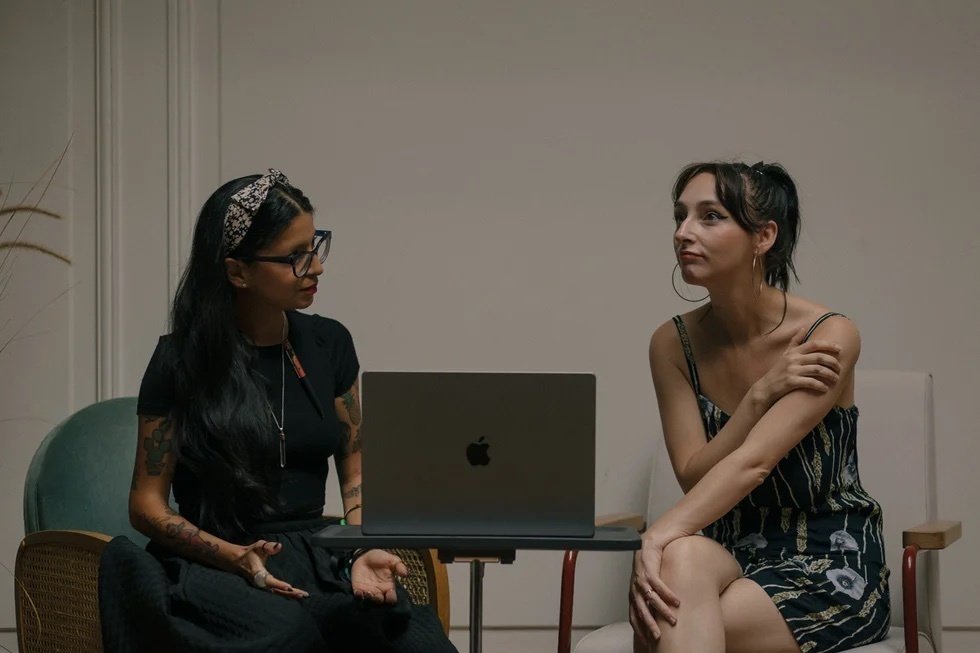Beyond yes or no: Exploring the use of dichotomous questions in job interviews
Jul 24, 2023
6 mins


Freelance journalist and writer
Chances are, you’ve already come across dichotomous questions before—perhaps while responding to a web survey or questionnaire. But did you know that these questions also find their way into the realm of job interviews? In fact, they can reveal far more about the workplace and the employer than you might expect.
to understand more about dichotomous questions and their place in job interviews, we spoke to Asya Isakova, Head of People and Culture at Inca Digital and Project Lead at Hygge Work. She provides invaluable insights to deepen our understanding of their significance and the benefits they can offer. We’ll explore their utility—when they prove helpful and when they become redundant—and examine effective response techniques. We’ll also look at how and when you, as the interviewee, can employ these questions to gain valuable information from the interviewer.
What are “dichotomous questions” exactly?
In essence, a dichotomous question presents two distinct options for a response, such as Yes/No, True/False, Fair/Unfair, or Agree/Disagree, and serves to draw a clear distinction between the qualities, experiences, or opinions of the respondent. “These questions are also called ‘closed-ended questions’ because they usually don’t allow any space for reflections, details, and context,” explains Isakova.
While dichotomous questions may initially appear restricted and technical, they have a significant presence in workplace settings, especially during job interviews. They can actually serve dual purposes—they allow employers to gain precise insights about job seekers, while simultaneously helping candidates to learn more about the prospective employer and work environment.
Facilitating the hiring process and getting precise answers from candidates
Isakova admits that she tends to avoid asking dichotomous questions in interviews for a number of reasons. “The first one is that during the interview, I try to get to know a candidate and give them as much space as possible to share their vision. Second, dichotomous questions might seem to have a more socially-acceptable answer, and when you build your interview around those questions, it seems more like a guessing game,” she says. She explains, however, that such short and close-ended questions do work for certain employers and in certain cases.
First, dichotomous questions can be effective in situations where employers seek people with specific skill sets or for particularly technical roles, as they allow them to assess whether candidates have the necessary competencies required for the position. “In these cases, dichotomous questions help employers streamline the hiring process and simply check off whether they possess a particular qualification, e.g. one year of accounting experience, with a straightforward “yes” or “no”.”
Isakova emphasizes that while the use of closed-ended questions aligns with employers’ preference for time efficiency, it may overlook the individualistic aspect of acquiring and applying the necessary competencies and experience. “These things cannot be generalized, as they can vary significantly for each individual. I find it essential to delve deeper into the specifics of someone’s professional background.”
Showcasing knowledge and unveiling company insights
Dichotomous questions present an excellent opportunity for candidates to showcase their knowledge and curiosity regarding the company. By employing this approach, you can effectively showcase the depth of your pre-interview research and the extent of your newly acquired knowledge about the company and its operations.
“These sorts of questions hold great value as they allow candidates to show me, as a recruiter, that they have proactively familiarized themselves with the company’s offerings, comprehended the information, and exhibit a genuine motivation to understand the company’s operations,” says Isakova. She emphasizes, however, that you should always expand such a close-ended question to further demonstrate your drive and curiosity. “It’s essential that this follow-up question is open-ended and can foster a dynamic conversation.”
For example, you could inquire about a recent event organized by the company and express your interest in whether they have any plans to host a similar event in the future (Yes/No answer). Then, follow up with an open-ended question that directly relates to the role you are applying for, such as what your responsibilities would entail in the event planning process if you were to be selected for the position. Likewise, you can inquire about the company’s products, reports, or most recent projects, followed by a role-focused open question.
Similarly, you can use this technique to inquire about the company’s culture and organizational structure in order to obtain a direct and precise response, allowing you to delve into the broader context.
For example, identify an aspect that holds significance for you, such as overtime compensation, and initiate the conversation with a dichotomous question: “Does the company provide compensation for overtime work?” (Yes/No answer). Depending on their response, you can then proceed to seek a more detailed explanation and gain a deeper understanding of the company’s values.
If the answer is affirmative, you can further inquire about overtime rates and the frequency of employees working beyond regular hours. “If the answer is no, I would rephrase the original dichotomous question into an open-ended one: ‘Could you elaborate on your approach to working overtime? What factors influence your perspective?’”, says Isakova.
”When I hear such a question, as a recruiter and representative of the company, I can gain a comprehensive understanding of the candidate’s viewpoint and provide the candidate with a holistic picture of the company’s policies and practices regarding overtime work,” she further explains.
Naturally, this strategy can be applied to any aspect that holds significance to you within the workplace, whether it’s mental health support, the employee reward system, growth opportunities, feedback delivery, or any other relevant area.
How to answer dichotomous questions
Responding to closed-ended questions can be quite stressful, no matter the circumstance. “Dichotomous questions, in particular, can create a sense of pressure, as if there is only one ‘correct’ answer or way of thinking,” says Isakova. “Candidates often feel compelled to guess what this ideal answer might be, based on the job description or their perception of the company and its work environment, rather than simply providing an honest response.”
How can we respond to such questions without feeling overwhelmed, attempting to conform our answers to fit our perception of the company, and instead authentically showcase our values and character? “For me, honesty is the best quality in a candidate,” Isakova explains.
By approaching dichotomous questions with honesty and a genuine reflection of your values and character, you provide the interviewer with valuable insights into your personality and work approach. “When a candidate openly expresses their thoughts and emotions, it showcases their remarkable self-awareness and emotional intelligence, which are both highly valuable for any position,” says Isakova.
Be honest, even if it means admitting you need more time to think about the answer or that you feel like one straight answer is not enough. “If I were a candidate and would have an issue with providing a definite ‘yes’ or ‘no’ answer on the spot, I would verbally explain that I see positives in both of the perspectives and that gathering more information would be necessary for me to make an informed decision based on the specific question at hand,” she explains. By approaching the question in this way, you showcase strategic thinking skills and demonstrate your critical thinking—competencies valued for any position, in any field.
The end goal: Prioritize yourself and your values
In cases where you are pushed to make a decision between one answer or the other, make sure you align your response with your personal and professional values—the employer’s reaction may be your most important criterium for whether this job is really for you.
Take Isakova’s past situation as an example. “In my personal experience as a candidate, I encountered a similar situation where a recruiter asked me if I was comfortable with working additional hours or staying late. My response was nuanced, as I explained that my willingness to work extra hours depended on the circumstances,” Isakova explains. “If there was a critical project with an impending deadline and no flexibility, I would certainly stay late. However, in general, I preferred to maintain a balanced work schedule.”
“Despite my explanation, the recruiter persisted and sought a straightforward answer of either yes or no regarding overtime. I ultimately responded with a ‘no,’” she continues. “Unfortunately I was not offered the job—yet this outcome reinforced the alignment of my values, as maintaining a healthy work-life balance is a significant priority for me.”
At the end of the day, job satisfaction plays a very important role in general life satisfaction and our overall happiness—and research confirms it. “That’s why the match between organizational and personal values is crucial. If you can choose the work that can really contribute to your well-being, why wouldn’t you do so?”
“Even if you find yourself uncertain or lacking an answer to a particular question, it’s perfectly alright. If you don’t meet the qualifications for a certain role, that’s okay too,” emphasizes Isakova. “Take it as an opportunity to learn and grow, or explore other job opportunities and positions that may be better suited to your skills and interests. Remember, there are numerous positions available, and everyone possesses different skill sets.” You will find something that aligns with your needs and abilities. These things just take time.
The bottom line on dichotomous questions
Using dichotomous questions as a precision tool can enhance your interview experience. They allow for concise responses to previous questions, help direct a more focused follow-up, and can be leveraged to highlight what matters to you as a candidate and employee.
Yet it’s important to remember that these questions should not be used in isolation. Refrain from settling for a simple dichotomous answer and moving on swiftly to something else. Instead, let these questions guide you toward deeper and more meaningful discussions, uncovering valuable insights along the way.
Photo: Welcome to the Jungle
Follow Welcome to the Jungle on Facebook, LinkedIn, and Instagram, and subscribe to our newsletter to get our latest articles every day!

More inspiration: Prepare for a job interview

Hybrid work goals: How to nail the negotiation in your next job interview
Want a hybrid work setup? Learn how to research, negotiate, and showcase the benefits of flexibility during your next job interview.
Dec 19, 2024

The secret to interview success? That annoying colleague
Got a story about a difficult coworker? Good! That office drama might just be your ticket to acing your next interview.
Dec 16, 2024

Is flexibility the key to “having it all” as a parent?
Balancing a career and parenthood can be challenging, but with the right approach, it’s possible to achieve both.
Oct 08, 2024

Slacker vs. control freak: What’s your interview style?
We’ve all been there: whether you're overly anxious or effortlessly cool—what best describes you?
Sep 24, 2024

Overcoming neurotypical norms during the job hunt
Neurodiverse individuals bring valuable innovation and should be more included in the workplace. How can we embrace their unique talents?
Sep 23, 2024
The newsletter that does the job
Want to keep up with the latest articles? Twice a week you can receive stories, jobs, and tips in your inbox.

Looking for your next job?
Over 200,000 people have found a job with Welcome to the Jungle.
Explore jobs